What is equity in poker and why should you care about it?
You may have heard the term “equity” in real estate conversations, meaning the share of the property which is yours. Equity in poker is the same thing. The equity of your hand shows your share of the pot, according to the chance your hand has of winning it.
Look at this example:
Let's say you and an opponent have gone all-in. The cards are flipped over and you both take a look.
Your hand: K♥ K♣
Your opponent’s hand: A♥ 10♥
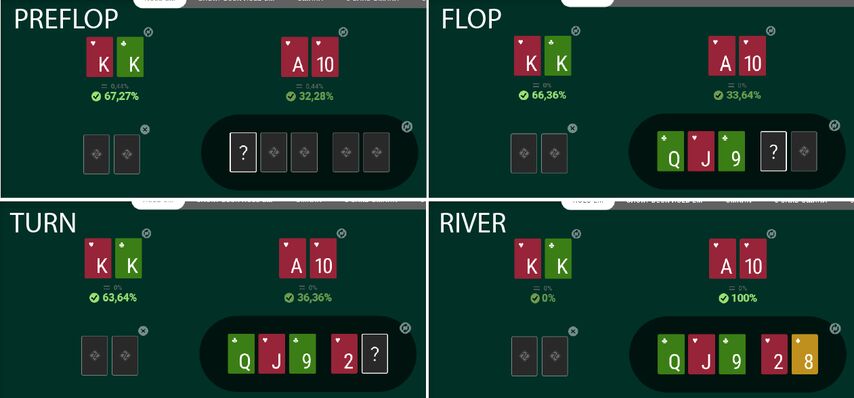
If we use an online calculator, we see that K♥ K♣ has around 67% equity, while A♥ 10♥ has about 32% equity. You’ll also notice that equity changes as the hand continues and new community cards are added.
What is Equity in Poker
It might seem like an odd way to think about the pot, but equity is your share of the chips in play – if the action ended at a specific moment.
In super simple terms, equity is the chance you will win the hand.
“Equity favorite” refers to the player with higher equity in the hand, while the “equity underdog” is a term for the one with less chance to win.
The more equity you have, the more likely it is that you will have the best hand combination by the end of the betting stages. If you have 80% equity, it means that there’s an 80% chance your hand will still be the best when the dust settles, but a 20% chance it will lose.
What is Equity Cashout in Cash Game Poker?
Let’s say that you move all in and your opponent calls during an online cash game. You proudly turn over A♦ Q♦ and your opponent shows a weaker hand; A♥ 10♣. You’ve got around 72% equity preflop, while your unfortunate opponent has about 22%.
In most situations, poker players will see community cards and compare hands on the river, but you can also “cashout” your equity (also known as EV Cashout on partypoker).
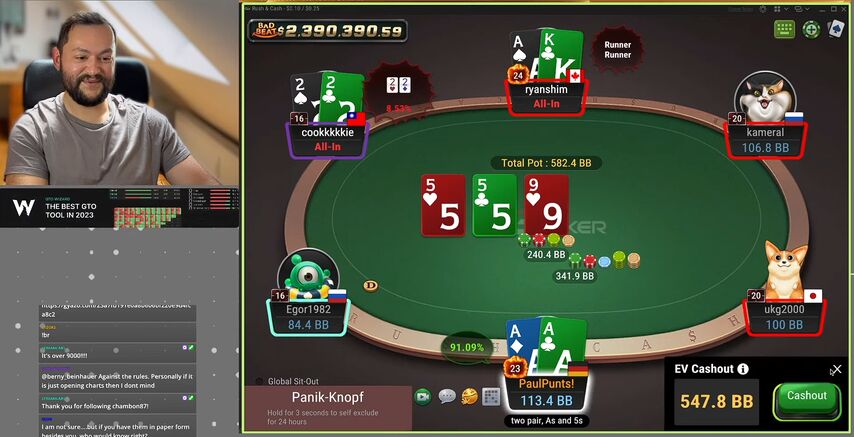
This means that your equity can be paid to you – right there and then. You’ll pay a small fee for this option and it’s not available in all poker rooms.
GGPoker, partypoker, and PokerStars all have the equity cashout option on certain cash game tables.
How to Calculate Equity in Poker
Now that you know more about the definition, you should learn how to calculate equity in poker.
Calculating equity is just a fancy term for finding out how many times your hand will win or lose over an almost infinite number of times. You can download poker tools like Flopzilla to calculate equity, but online tools are very convenient as well.
We’ve created a free equity calculator that works in your browser. Select the number of players you want to simulate and choose your poker format, including Holdem, short deck Holdem, Omaha, 5-card Omaha, and 6-card Omaha.
The online calculator will give you the equity you’re looking for instantly, but what about in live poker games? Let’s talk about calculating outs and equity in your head.
How to Calculate Your Outs and Equity
You can’t bring our online calculator with you to assist during poker sessions. That’s no problem though, because you can make equity calculations quite fast.
An “out” is any card that gives us the winning hand. Before the cards are turned face-up, you won’t know what your opponent has. You can still estimate your outs against their range (if you know your way around a poker range chart).
Let’s say your opponent raised preflop, continuation bet on a flop of A♥ 4♣ 5♦, and also bet when an 8♥ came on the turn.
The board is now A♥ 4♣ 5♦ 8♥.
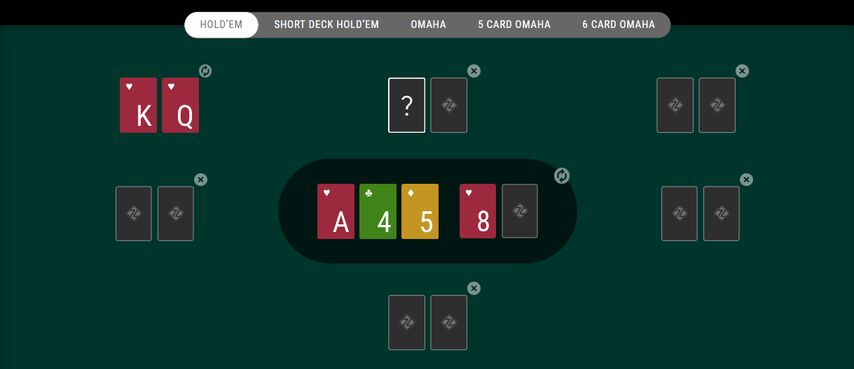
You have K♥ Q♥ and you’re on a flush draw. You believe that your opponent has a pair of Aces – perhaps a hand like A♣ 10♣, A♦ J♦, or something similar.
A pair of Kings or Queens won’t help you, meaning that only a ♥ can win you the pot.
There are 44 cards left in the deck (52 minus 2 from you, 2 from your opponent, and 4 on the flop). Out of those 44 cards, you need to hit one of 9 ♥ cards to win. Those 9 cards are your “outs”.
9/44 = 0.20 or about 20%
We have a 20% chance of winning the hand on the river, meaning 20% equity.
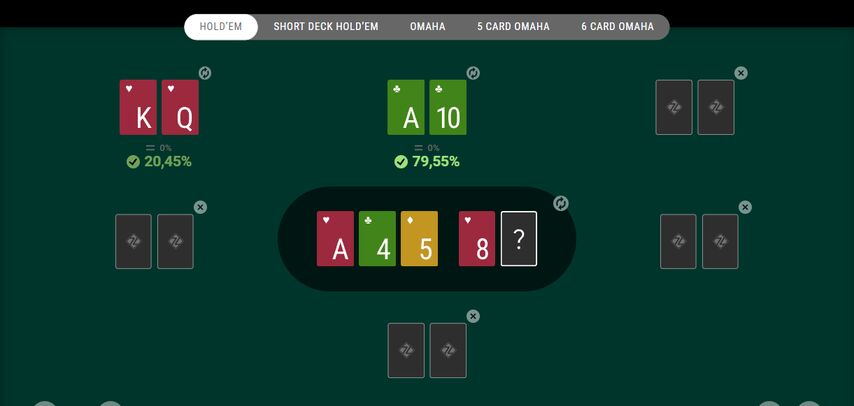
Steps for Calculating Outs in Your Head
You can use this technique if you are on a draw or considering calling an all-in.
This is called the rule of 4 and 2. It’s a very useful tool for quickly calculating your outs.
If you are on the flop, you can multiply the number of outs you have by 4. The number you get is a rough chance of hitting your outs on the turn and river combined. This number isn’t exact like a calculator, but it’s close enough to help you.
On the turn, you can calculate your outs by 2 and that number will be the chance you hit your out on the river.
When you play online poker, this will help you decide which draws to chase, which spots to call all-ins, and much more.
- Increased first deposit bonus
- Increased rakeback and reloads
- Help with deposits and cashouts
- Access to private freerolls
- Round-the-clock support
How to Use Equity in Poker Games
You won’t know the real equity until the cards are turned over, but that shouldn’t stop you from thinking about equity during the hand.
Consider your equity against different hands.
You won’t be able to calculate equity for every single matchup, but you should get familiar with some common equities. Do some self-studying with our online calculator and learn equities for different common scenarios.
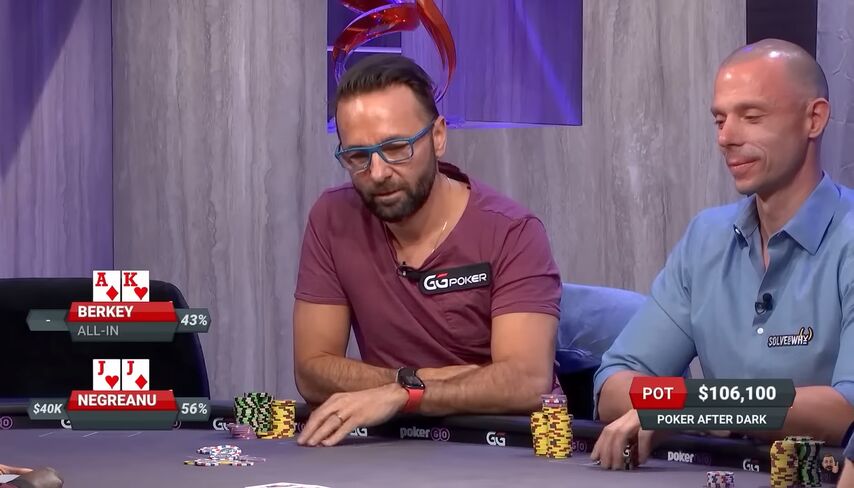
Did the flop, turn, or river, change your equity?
Your equity changes as new cards appear and you’ve got to think about how they affect your equity. Did the new card add any outs for you, or did the opponent’s equity improve?
More players in the hand means less equity for you.
Avoid entering the pot with lots of opponents. The equity gets divided multi-way, so you end up with a smaller portion, meaning less chance to win the pot. This is true for all hands, even premium hands like Aces and Kings. Isolate your opponent instead of letting everyone see a flop together.
Understand the equity of coinflips and practice with freerolls.
If you play tournament poker (MTT, SNG, Spins) you need to get familiar with coinflips, meaning two similar-strength hands facing off. By entering free tournaments, you can study your equity in these spots and still play for some real cash.
Every single hour on partypoker, there are Round the Clock freerolls with prizes from $50 to $200. It’s free to enter and you can play these events alongside your usual games, like cash or other MTTs.
We’ve also got a long list of freerolls running on other poker sites – check to see if your room is there!


























